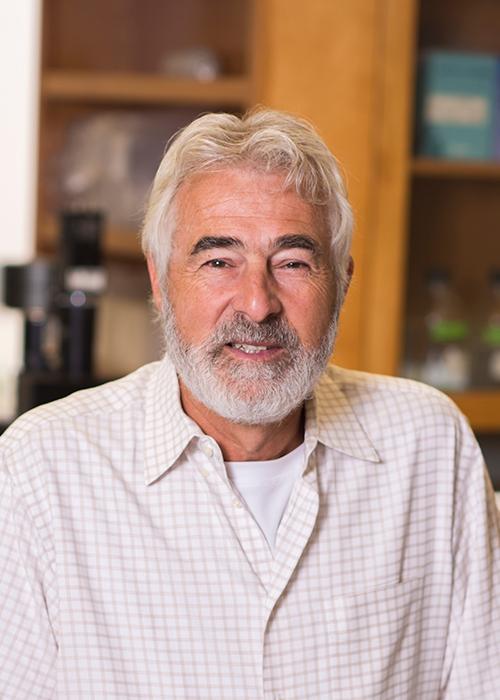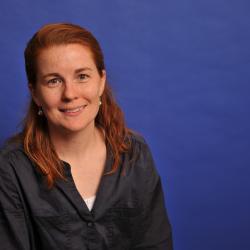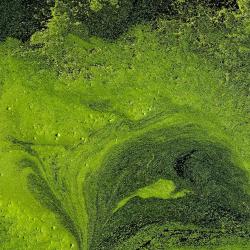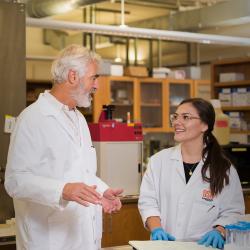
Stephen J. Giovannoni
Stephen J. Giovannoni
Research
We study how biology interacts with the atmosphere and the oceans to change global patterns in the movement of carbon and other elements. Our experiments begin at sea, but we carry this research into the laboratory, where we work with microbial cells and genome sequences to discover new cell types and new biochemical transformations of matter. Our goals are to understand how these extraordinary cells evolved, how they function, and how planktonic ecosystems will change in response to ocean warming.
Research Interests
- Ocean Carbon Cycle
- Marine Microbiology
- Microbial Genome Evolution
High Throughput Cultivation Laboratory
Dr. Stephen Giovannoni founded Oregon State's HTCL, which pioneered automated methods for isolating and studying the elusive microbes that often dominate natural ecosystems. His research team developed SAR11 cell culture as a model system for studying the oceanic carbon cycle and streamlining, a path to minimal complexity in microbial cell architecture. His research also focuses on the role of SAR202 marine bacteria in ocean carbon sequestration, and biochemical mechanisms of ocean deoxygenation.
Courses taught
Education
Ph.D., University of Oregon, Biology, 1984
M.A., Boston University, Biology, 1978
B.A., University of California, San Diego, Biology, 1974
Publications
- Selected Publications, see more at PubMed
- Lim, Y., Seo, JH., Giovannoni, SJ., Kang, IL., Cho, JC. 2023. Cultivation of marine bacteria of the SAR202 clade. Nature Communications. DOI: 10.1038/s41467-023-40726-8.
- Noell, SE., Hellweger, FL., Temperton, B., Giovannoni, SJ. 2023. A Reduction of Transcriptional Regulation in Aquatic Oligotrophic Microorganisms Enhances Fitness in Nutrient-Poor Environments. MICROBIOLOGY AND MOLECULAR BIOLOGY REVIEWS. DOI: 10.1128/mmbr.00124-22.
- Halsey, KH. Giovannoni, SJ. 2023. Biological controls on marine volatile organic compound emissions: A balancing act at the sea-air interface. DOI: 10.1016/j.earscirev.2023.104360.
- Lim, Y. Seo, JH. Giovannoni, SJ. Kang, IL. Cho, JC. 2023. Cultivation of SAR202 Bacteria from the Ocean. bioRxiv. DOI: 10.1101/2023.03.25.534242.
- Noell, SE., Brennan, E., Washburn, Q., Davis, EW., Hellweger, FL., Giovannoni, SJ. 2023. Differences in the regulatory strategies of marine oligotrophs and copiotrophs reflect differences in motility. Environmental Microbiology. DOI: 10.1111/1462-2920.16357.
- Lim, Y., Seo, JH., Giovannoni, SJ., Kang, IL., Cho, JC. 2023. Cultivation of marine bacteria of the SAR202 clade. Nature Communications. DOI: 10.1038/s41467-023-40726-8.
- Noell, SE., Hellweger, FL., Temperton, B., Giovannoni, SJ. 2023. A Reduction of Transcriptional Regulation in Aquatic Oligotrophic Microorganisms Enhances Fitness in Nutrient-Poor Environments. MICROBIOLOGY AND MOLECULAR BIOLOGY REVIEWS. DOI: 10.1128/mmbr.00124-22.
- Halsey, KH. Giovannoni, SJ. 2023. Biological controls on marine volatile organic compound emissions: A balancing act at the sea-air interface. DOI: 10.1016/j.earscirev.2023.104360.
- Lim, Y. Seo, JH. Giovannoni, SJ. Kang, IL. Cho, JC. 2023. Cultivation of SAR202 Bacteria from the Ocean. bioRxiv. DOI: 10.1101/2023.03.25.534242.
- Noell, SE., Brennan, E., Washburn, Q., Davis, EW., Hellweger, FL., Giovannoni, SJ. 2023. Differences in the regulatory strategies of marine oligotrophs and copiotrophs reflect differences in motility. Environmental Microbiology. DOI: 10.1111/1462-2920.16357.
- Giovannoni, S., F. Chan, E. Davis, C. Deutsch , S. Wolf. 2021. Biochemical Barriers on the Path to Ocean Anoxia? mBIO. DOI: https://doi.org/10.1128/mBio.01332-21
- Kivenson, V. and S. J. Giovannoni. 2020. An Expanded Genetic Code Enables Trimethylamine Metabolism in Human Gut Bacteria. mSystems DOI: 10.1128/mSystems. doi: 00413-20



